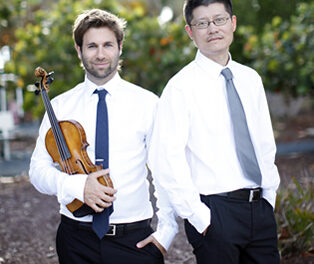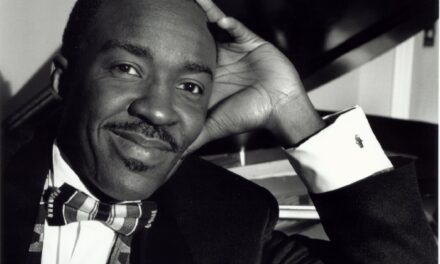 Poor Paula. Within the past three weeks, actor Paula Baldwin has distinguished herself in two of the finest theatre productions to originate in Charlotte since the onset of COVID-19 pandemic. First to go online was Children’s Theatre’s world premiere of L M Feldman’s adaptation of Margarita Engle’s Tropical Secrets: Holocaust Refugees in Cuba. No less auspicious – and only slightly less technically polished – was the streamed remount of Three Bone Theatre’s acclaimed 2019 production of Protective Custody: Prisoner 34042, adapted by Charles LaBorde from Dr. Susan Cernyak-Spatz’s harrowing Holocaust memoir. Both of these fine webcasts featured Baldwin in multiple roles, reinforcing claims that she is the finest character actor in town. Both Charlotte-based efforts remain unreservedly recommendable to the wide world of English-speaking theatre lovers who are blessed with online access. After laurels such as these, it was appalling to find Baldwin involved – albeit as a director and mercifully out of sight – in Central Piedmont Community College‘s visually bland and technically inept Sense and Sensibility.
Poor Paula. Within the past three weeks, actor Paula Baldwin has distinguished herself in two of the finest theatre productions to originate in Charlotte since the onset of COVID-19 pandemic. First to go online was Children’s Theatre’s world premiere of L M Feldman’s adaptation of Margarita Engle’s Tropical Secrets: Holocaust Refugees in Cuba. No less auspicious – and only slightly less technically polished – was the streamed remount of Three Bone Theatre’s acclaimed 2019 production of Protective Custody: Prisoner 34042, adapted by Charles LaBorde from Dr. Susan Cernyak-Spatz’s harrowing Holocaust memoir. Both of these fine webcasts featured Baldwin in multiple roles, reinforcing claims that she is the finest character actor in town. Both Charlotte-based efforts remain unreservedly recommendable to the wide world of English-speaking theatre lovers who are blessed with online access. After laurels such as these, it was appalling to find Baldwin involved – albeit as a director and mercifully out of sight – in Central Piedmont Community College‘s visually bland and technically inept Sense and Sensibility.
Adapted from Jane Austen‘s classic debut novel by Jon Jory, the estimable former artistic director at Actors Theatre of Louisville, the playscript is as solid as steel and ruthlessly condensed, almost absurdly so at times. Calling for “rolling doors and movable furniture” on a bare stage, the script gets exactly that sort of fluid production from Baldwin and her capable cast. After more than a year of not motoring into Charlotte to watch live theatre, I must confess to an emotional tug and some wistful nostalgia the first few times scenic designer Beth Aderhold‘s windows, doorway, and furniture were shifted around the Halton Theater stage with lights dimmed, even if some of the ensuing scenes ate up less clock time than the scenery changes.
What color may be lacking in these pallid set pieces is fully offset by the variety, colors, and richness of Emily McCurdy’s costume designs. Or I can safely imagine they do. Sadly, sufficient color hardly proves to be the biggest hurdle to our visual enjoyment of the romantic misadventures of the Dashwood sisters, Elinor and Marianne, Austen’s respective avatars of sense and sensibility. Unlike the recent productions from Children’s Theatre and Three Bone, CPCC Theatre has not been able to solve the riddle of how to avoid the Scylla and Charybdis of theatre performance during a pandemic, where theatre companies either yield to imposing masks on actors who perform together or to separating them artificially into Zoom-styled cubicles.
We don’t really see Lucianne Hamilton Di Gaetano as the prim and proper Elinor or Gina Belmont as the rash and romantic Marianne, because they don’t cheat at all on the protection offered by their masks. Each time they appeared singly, I had to reorient myself on which sister was before me, and when they appeared together, I needed to satisfy myself on which was which. Even if the CP webstream had favored us with two-shots on our screens, the masks covering their mouths and noses would have hindered me in determining which sister was speaking. But there weren’t two-shots on screen to bring us closer, let alone closeups. Cameras consistently viewed the action at an uncomfortable distance, the equipment yielded snowy images far short of HD sharpness, and the actors’ faces were routinely overexposed and ghosted.
Audio was worse, as bad as it has ever been during the notoriously bad acoustic history of Halton Theater, where sound system woes stretch back more than 15 years. Think of it: CPCC is spending over $115 million to demolish and replace one of the two theaters on campus, they offer courses videography and audio engineering, yet they cannot come close to matching the video or audio quality produced by the Three Bone Theatre company, whose comparative budget is less than a shoestring. After navigating a ticketing system that is also undergoing alterations, you enter and find yourself assailed by a soundtrack riddled with clicks, bumps, and feedback, where every scene commences with an undercurrent of windy noise appropriate for the mad scene in King Lear. If this run of Austen is serving as the gateway event for CPCC’s ongoing Sensoria Festival of the arts, I’d say this is one rusty gate that needs to be far closer to audio and video state-of-the-art. As for the lack of even an online playbill, that follows a longtime tradition of stinginess by CP toward their winter theatre programming.
Frame after frame of footage shot by Children’s and Three Bone sharply discloses the microphones taped to their performers’ hairlines, revealing the sort of equipment CPCC should be updating to, properly installing, and learning to use. Against this muddiest of streams, McCurdy’s costumes push back best in differentiating between the menfolk: Robert Brafford as the patient and constant Colonel Brandon, Matt Howie as the conflicted and diffident Edward Ferrars, William McGinnis as the dashing adventurer John Willoughby, and James K Flynn as jovial huntsman Sir John Middleton. Women mostly emerge from a flowery mist with the exception of stooped-over Pamela Thorson as the kindly old Mrs. Jennings and Lauren Wilson as the flashy, shallow opportunist, Lucy Steele.
All of these characters bring fresh energy to the comedy and the romantic drama while Belmont and Di Gaetano keep on with the heavy lifting. Neither Elinor nor Marianne is as high-strung or witty as Elizabeth Bennett in Pride and Prejudice, and their masks worked to conceal each character’s arresting beauty. What kept them fascinating for me was the prime uniqueness that Austen brought so simply and vividly to literature, the electricity of a woman’s point of view. If being a religious writer were a matter of sticking strictly to what you truly know, Austen would be among the most devout. What her protagonists don’t know about their men is often the core of her comedy and drama. The marriageable men they have fallen for are always largely inscrutable mysteries that they misread over and over. Married men, on the other hand, are comparatively humdrum and predictable – intentionally or unintentionally amusing, even when they’re annoying.
Most diverting for me were those scenes where Elinor and Marianne discuss their men. Here was the intersection of comedy and drama and lessons in living, for while love isn’t blind, it inevitably creates blind spots when Austen’s protagonists cast their looks on those they love. In many respects, Elinor sees Willoughby and Brandon more clearly than Marianne does, and Edward’s heart is more of an open book to Marianne than to Elinor, the woman he clearly adores. Dispelling these blind spots happens gradually as Austen’s heroines grow up and mature, but it’s not all a simple formula, for the men are even less perceptibly growing, maturing, and changing at the same time. Outside of these chatty sibling confabs, Belmont was most memorable in her drama queen illness, her convalescence, and her slow realization of all the devotion that surrounded her. Di Gaetano was more moving for me in projecting Elinor’s self-denying stoicism, perhaps because she vividly reminded me of Anne Elliot, the long-suffering heroine of Persuasion, Austen’s most poignant work.
Masked and apparently bewigged, Brafford as Colonel Brandon wasn’t at all recognizable to me, though his voice was vaguely familiar. These disguises helped convince me that Brandon was sufficiently older than Marianne to give the teen some pause, while Brafford’s voice convinced me of the Colonel’s warmth, patience, civility, and goodness. On the other hand, Flynn’s voice, heard locally over the radio and at sports arenas for decades, was instantly recognizable, molding itself readily into Sir John’s heartiness and the apothecary’s dignified solemnity. McGinnis’ rascality as Willoughby, Howie’s halting deference as Edward, Josh Carper’s suave cynicism as Edward’s younger brother Robert, and Jonathan Stephens’ gawky awkwardness as the sisters’ henpecked older brother made me wish to see more of them after the pandemic. Or at least in a video that measured up to Children’s Theatre standards.
Same applies to Wilson as the unattached, loose-lipped Lucy, the Dashwood sisters’ only rival in sight. A spinster herself, Austen tended to view married women with the same amusement that she viewed married men – but, as her novels reveal, she knew them better and heard them better. That helps Amy Dunn as the sisters’ anxious and tedious mother, Iris DeWitt as their imperious sister-in-law, and Thorson as the feisty Jennings emerge from their cocoons of masks, wigs and similar flowery costumes with individualized characters. Just not enough. I almost wished that Baldwin had been given a chance to look at and listen to this wretched video representation of all this fine work. Then she might have deflected some of the nuances that remained buried by the inadequacies and distortions of this CPCC video and directed her cast toward a more exaggerated use of their voices – as if they were performing for radio rather than a visual medium. As I said, poor Paula.
Sense and Sensibility continues through Sunday, April 18. For more details on this production, please view the sidebar.












